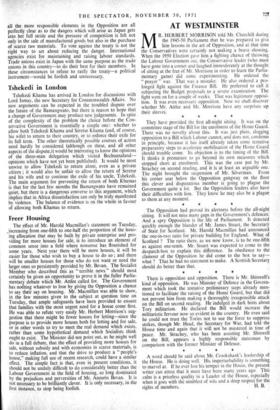AT WESTMINSTER R. HERBERT MORRISON told Mr. Churchill during the
1945-50 Parliament that he was prepared to give him lessons in the art of Opposition, and at that time the Conservatives were certainly not making a brave showing. When the 1950 Election gave him a fighting chance of throwing the Labour Government out, the Conservative leader (who must have gone into a corner and laughed immoderately at the thought of sitting at the feet of Mr. Morrison in order to learn the Parlia- mentary game) did some experimenting. He ordered the " prayer " war. That was a mistake. He also ordered a pro- longed fight against the Finance Bill. He preferred to call it subjecting the Budget proposals to a severe examination. The fight went on for a couple of weeks. That was legitimate opposi- tion. It was even necessary opposition. Now we shall discover whether Mr. Attlee and Mr. Morrison have any surprises up their sleeves.
* *
They have provided the first all-night sitting. It was on the committee stage of the Bill for the enrolment of the Home Guard. There was no novelty about this. It was just plain, sloggiqg opposition to a Bill which Labour cannot, and does not, condemn in principle, because it has itself already taken some tentative preparatory steps to accelerate mobilisation of the Home Guard should trouble come. Its objection is to the timing of the Bill. It thinks it premature to go beyond its own measures which stopped short at enrolment. This was the case put by Mr.
Strachey on second reading, and it is at least an arguable one. is The night brought the suspension of Mr. Silverman. From his corner seat below the Opposition gangway on the floor this clever and disputatious member is going to plague the Government quite a lot. But the Opposition leaders also have their difficulties with him. They know he may also be a plague to them at any moment.
* * * *
The Opposition had proved its alertness before the all-night sitting. It will not miss many gaps in the Government's defences: And a spry Opposition is the life of Parliament. It detected quickly enough the blunder of Mr. James Stuart, the Secretar$ of State for Scotland. Mr. Harold Macmillan had announced the one-in-two ratio for private building for England. What of Scotland ? The ratio there, as we now know, is to be one-fifth as against one-tenth. Mr. Stuart was expected to come to the despatch-box to explain this difference. In obedience to the clamour of the Opposition he did come to the box to say— what ? That he had no statement to make. A Scottish Secretary should do better than that.
* * * *
There is opposition and opposition. There is Mr. Shinwell's kind of opposition. He was Minister of Defence in the Govern- ment which took the tentative preliminary steps already men- tioned to facilitate the raising of the Home Guard, but that did not prevent him from making a thoroughly irresponsible attack on the Bill on second reading. He indulged in dark hints about Tory militarism. He declared the Bill would increase the militaristic fervour now so evident in the country. He even said he could not trust the Tories not to use the force to suppress strikes, though Mr. Head, the Secretary for War, had told the House time and again that it will not be mustered in time of peace. Mr. Strachey, who has been assisting Mr. Shinwell on the Bill, appears a highly responsible statesman by comparison with the former Minister of Defence.
* * * *
A word should be said about Mr. Crookshank's leadership of the House. He is doing well. ' His imperturbability is something. to marvel at. If he ever lost his temper in the House, the present writer can attest that it must have been many years ago. ThiS calm is a priceless quality in a Leader of the House, especially when it goes with the nimblest of wits and a deep respect for the


































 Previous page
Previous page